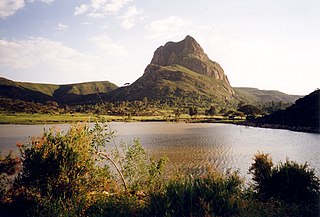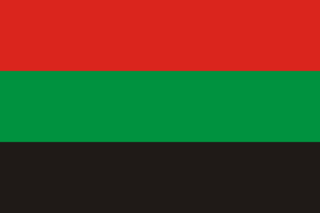
Mengistu Haile Mariam is an Ethiopian soldier and politician who was the leader of Ethiopia from 1977 to 1991 and General Secretary of the Workers' Party of Ethiopia from 1984 to 1991. He was the chairman of the Derg, the socialist military junta that governed Ethiopia, from 1977–87, and the President of the People's Democratic Republic of Ethiopia (PDRE) from 1987–91. Considered to be one of the most notorious African leaders of the 20th century, Mariam's reign was infamous for its brutality, autocracy and economic mismanagement.

The All-Ethiopia Socialist Movement is a political party in Ethiopia. A Marxist-Leninist organization, MEISON played an active role in Ethiopian politics during the 1970s. Both it and the Ethiopian People's Revolutionary Party (EPRP) were enthusiastic supporters of the revolution that toppled Emperor Haile Selassie. However, as Mengistu Haile Mariam rose to power as leader of the ruling Derg government, conflict began to develop between the two groups, with MEISON aligning itself with Mengistu.

The Hager Fikir Theatre in Addis Ababa is not only the theatre with the greatest tradition in Ethiopia but also the oldest indigenous theatre in Africa. It stands for more than 70 years of cultural life in Addis Ababa. It is a playhouse where modern Ethiopian music and drama were born and nurtured. Many stars like Aster Aweke, Tilahun Gessesse and Frew Hailu began their careers on the stage of Hager Fikir Theatre. Both traditional Ethiopian plays and translations of plays by William Shakespeare, Friedrich Schiller, Henrik Ibsen and Molière have been produced at Hager Fikir Theatre in recent decades.
Qey Shibir or Kay Shibbir, also known as the Ethiopian Red Terror, was a violent political repression campaign of the Derg against other competing Marxist-Leninist groups in Ethiopia and Eritrea from 1976 to 1977. The Qey Shibir was an attempt to consolidate Derg rule during the political instability after their overthrow of Emperor Haile Selassie in 1974 and the subsequent Ethiopian Civil War. The Qey Shibir was based on the Red Terror of the Russian Civil War, and most visibly took place after Mengistu Haile Mariam became Chairman of the Derg on 3 February 1977. It is estimated that 30,000 to 750,000 people were killed over the course of the Qey Shibir.

Ethiopia–Israel relations are foreign relations between Ethiopia and Israel. Both countries re-established diplomatic relations in 1992. Ethiopia has an embassy in Tel Aviv; the ambassador is also accredited to the Holy See, Greece and Cyprus. Israel has an embassy in Addis Ababa; the ambassador is also accredited to Rwanda and Burundi. Israel has been one of Ethiopia's most reliable suppliers of military assistance, supporting different Ethiopian governments during the Eritrean War of Independence.

Merera Gudina is an Ethiopian professor and a politician. He is the leader of the Oromo People's Congress (OPC), a political party representing the Oromo people. The organization is opposed to the ruling Ethiopian People's Revolutionary Democratic Front. His party struggles for equality and fairness for all Ethiopian. He has been described as Ethiopia's "leading opposition politician".

Medrek is an Ethiopian political coalition founded in 2008 by former defense minister Siye Abraha and former president Negasso Gidada. On 2008 election, Medrek won a single seat in the House of Peoples' Representatives, representing an electoral district in Addis Ababa. This was allegedly due to lack of election transparency. Medrek won 30% of the individual vote nationwide but it received only one seat in parliament because of Ethiopia's winner takes all system for each constituency.
Tewodros Bekele was an Ethiopian trade unionist. Tewodros was a leader of the Seamen's Union. He was a leading member of the All-Ethiopian Socialist Movement (MEISON). In early 1977 he became the founding chairman of the All-Ethiopia Trade Union (AETU).
Abune Merkorios is the fourth Patriarch of the Ethiopian Orthodox Tewahedo Church, elected after the death of Abuna Takla Haymanot in May 1988. Merkorios remained Patriarch for three years until 1991, when the Ethiopian People's Revolutionary Democratic Front (EPRDF) overthrew the Communist military junta known as Derg in Addis Ababa. After spending almost three decades living in exile, he was allowed to return to Addis Ababa and be recognized as Patriarch alongside Abune Mathias.

The Relief Society of Tigray is an NGO based in Tigray, northern Ethiopia.REST was founded in 1978 as an organization providing relief efforts to civilians. As of 2008, Teklewoini Assefa served as Executive Director of REST. REST emerged as the humanitarian wing of the Tigray People's Liberation Front (TPLF) and has remained closely linked to TPLF. REST was active throughout the armed conflict of the 1980s, including during the devastating 1984-1985 famine. Since the 1990s it is the major NGO operating in Tigray.
Democracia is the organ of the Ethiopian People's Revolutionary Party. It was launched as a clandestine weekly newspaper in July 1974, as the Central Committee of the Ethiopian People's Liberation Organization returned to Ethiopia from exile. At the time the EPRP was often known simply as the Democracia group, as the existence of the party was not publicly known.
The Provisional Office for Mass Organizational Affairs was a political organization in Ethiopia active between 1975 and 1979. POMOA functioned as a forum to involve different Marxist-Leninist organizations in the revolutionary process and to politicize and organize the masses.

The Gambela People's Liberation Movement was a rebel group in the Gambela Region in Ethiopia. The GPLM was founded by Anuak dissidents during the Derg and Woyane regime. The organization remained dominated by Anuaks. Agwa Alemu was the chairman of the GPLM.
Alemu Abebe is an Ethiopian politician. He served as mayor of Addis Ababa during the years of Red Terror.
Lencho Letta is an Ethiopian politician and Oromo activist who was founding member of Oromo Liberation Front (OLF). He was the Deputy Secretary General of the Oromo Liberation Front (OLF) from 1974 to 1995. In Late 1990s, Lencho left OLF leadership due to ideological differences. He is currently the leader of Oromo Democratic front, which was formed in 2013.
The Mecha and Tulama Self-Help Association was an Oromo social movement in Ethiopia. The movement was primarily based in Bale, but was active in other regions as well. The organization committed acts of terrorism such as throwing a bomb at the coronation anniversary of emperor Haile Selassie and was banned in 1966, and some of its leaders were jailed or killed. The Association was established by Oromo nationalists like Mamo Mezemer, Haila Mariam Gemeda and Alemu Kitessa.

Kaliti Prison in Addis Ababa is one of the several federal prisons of Ethiopia. Commonly referred to as a gulag, it serves as the main prison of the country. It is 11 km south of central Addis Ababa, in Akaky Kaliti, the southernmost subcity of the nation's capital.
The following lists events that happened during 2016 in Ethiopia.
A State of Emergency was declared on Sunday, October 9, 2016 by Ethiopian Prime Minister Hailemariam Desalegn, although the state of emergency reportedly took effect on Saturday, October 8, 2016. The state of emergency authorizes the military to enforce security nationwide. It also imposes restrictions on freedom of speech and access to information. Media have reported the state of emergency’s duration was announced for six months. The Constitution of Ethiopia provides for a six-month state of emergency under certain conditions. The government’s declaration of state of emergency followed massive protests by the Oromo and Amhara ethic groups against the government, which is controlled by people in the Tigrayan ethnic group, a smaller ethnic minority. It is the first time in approximately 25 years that a state of emergency has been declared in Ethiopia. In March 2017, Ethiopia’s parliament voted to extend the state of emergency for another four months.
Alem Bekagn, also known as Akaki Prison or Kerchele Prison, was Ethiopia's central prison until 2004. Located in Addis Ababa, the prison possibly existed as early as 1923, under the reign of Empress Zewditu, but became notorious after Second Italo-Ethiopian War as the site where Ethiopian intellectuals were detained and killed by Italian Fascists in the Yekatit 12 massacre. After the restoration of Emperor Haile Selassie, the prison remained in use to house Eritrean nationalists and those involved in the Woyane rebellion. Under the Communist Derg regime that followed, the prison was the site of another mass killing, the Massacre of the Sixty, and of the torture and execution of rival groups in the Red Terror. The prison remained a site of human rights abuses until the Ethiopian People’s Revolutionary Democratic Front entered Addis Ababa on 28 May 1991, after which it became a normal prison. The prison was closed in 2004 and demolished in 2007 to allow the construction of the headquarters of the African Union.







